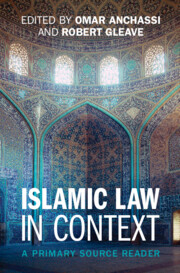Book contents
- Islamic Law in Context
- Islamic Law in Context
- Copyright page
- Contents
- Acknowledgements
- Contributors
- Introduction
- Part I Islamic Legal Theory (Uṣūl al-Fiqh) and Related Genres
- Part II Islamic Jurisprudence (Fiqh) and Related Genres
- Part III Legal Opinions (Fatwās)
- Part IV Court Judgments and Other Court Documentation
- Chapter 24 Introduction to Part IV
- Chapter 25 The Restitution of Conjugal Rights
- Chapter 26 A Sharīʿa Court Judgment of Muḥammad Ḥusayn Fishārakī (d. 1353/1935) Reviving the Safavid Waqf of Mīrzā Aḥmad Kafrānī (d. after 988/1580)
- Chapter 27 Authenticating Marriage
- Chapter 28 Judgment of the Moroccan Supreme Council of Sharīʿa Appeals, Ruling No. 52 on Issue No. 4164 concerning Inheritance, Slavery and Paternity (1359/1943)
- Chapter 29 Sharīʿa, Sales and Loans in the Malaysian High Court
- Chapter 30 A Sharīʿa Court Decision on the Type of ‘Compensation’ in Huləʾə/Khulʿ Divorce
- Part V Judicial Manuals and Reference Books
- Part VI Alternative Sources for Islamic Legal Studies
- Name Index
- Subject Index
- References
Chapter 28 - Judgment of the Moroccan Supreme Council of Sharīʿa Appeals, Ruling No. 52 on Issue No. 4164 concerning Inheritance, Slavery and Paternity (1359/1943)
from Part IV - Court Judgments and Other Court Documentation
Published online by Cambridge University Press: 14 November 2024
- Islamic Law in Context
- Islamic Law in Context
- Copyright page
- Contents
- Acknowledgements
- Contributors
- Introduction
- Part I Islamic Legal Theory (Uṣūl al-Fiqh) and Related Genres
- Part II Islamic Jurisprudence (Fiqh) and Related Genres
- Part III Legal Opinions (Fatwās)
- Part IV Court Judgments and Other Court Documentation
- Chapter 24 Introduction to Part IV
- Chapter 25 The Restitution of Conjugal Rights
- Chapter 26 A Sharīʿa Court Judgment of Muḥammad Ḥusayn Fishārakī (d. 1353/1935) Reviving the Safavid Waqf of Mīrzā Aḥmad Kafrānī (d. after 988/1580)
- Chapter 27 Authenticating Marriage
- Chapter 28 Judgment of the Moroccan Supreme Council of Sharīʿa Appeals, Ruling No. 52 on Issue No. 4164 concerning Inheritance, Slavery and Paternity (1359/1943)
- Chapter 29 Sharīʿa, Sales and Loans in the Malaysian High Court
- Chapter 30 A Sharīʿa Court Decision on the Type of ‘Compensation’ in Huləʾə/Khulʿ Divorce
- Part V Judicial Manuals and Reference Books
- Part VI Alternative Sources for Islamic Legal Studies
- Name Index
- Subject Index
- References
Summary
This chapter explores an unusually complicated sixteen-year-long (1928-44) inheritance and paternity dispute that arose originally in the first-instance Sharīʿa Court of Casablanca. The central question in the case was whether the plaintiff’s grandson was entitled to inherit his father and grandfather. The dispute provides numerous lenses into uses of the past as it concerns a Sharīʿa court operating in an ostensible judicial plurality established and enforced by a colonial power (French Protectorate Morocco, 1912-56). Although the judges’ competence was narrowed by the fact of French hegemony, they still enjoyed sufficient independence to use their own legal traditions to adjudicate the cases before them.
Keywords
- Type
- Chapter
- Information
- Islamic Law in ContextA Primary Source Reader, pp. 296 - 310Publisher: Cambridge University PressPrint publication year: 2024

